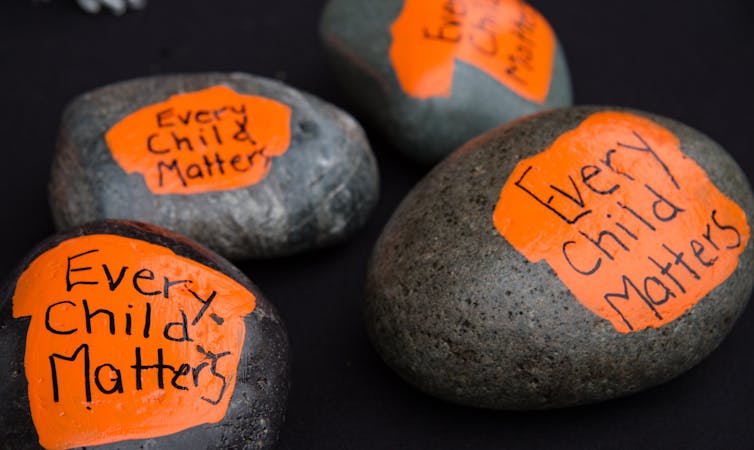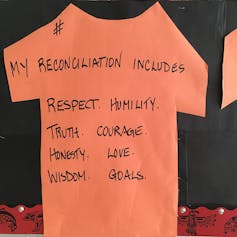Canada News
Racism contributes to poor attendance of Indigenous students in Alberta schools: New study

(Province of British Columbia/Flickr), CC BY-NC-ND
Regular attendance in schools is a factor that affects positive and healthy childhood development. Students with poor school attendance are at an increased risk for a number of negative outcomes. Students who experience chronic stress, such as socio-economic disadvantage, mental health challenges or cultural marginalization, are at an increased risk for school absenteeism.
In Alberta, recent data from Rocky View Schools — the province’s fifth largest school board serving students west, north and east of Calgary — suggest that of the population of students who identify as Indigenous within the district, 30 per cent can be considered chronically absent the 2017-18 school year. Of the population of on-reserve students attending Rocky View Schools, a staggering 80 per cent of all on-reserve students were chronically absent. Enrolment of on-reserve students has also decreased significantly in the past five years.
These findings prompted Rocky View Schools to undertake further research, funded by Alberta Education, to examine this gap.
As a white educator who spent years teaching in kindergarten to Grade 12 schools, predominately in Rocky View Schools, I conducted research with my colleague Mairi McDermott to probe deeper into on-reserve Indigenous students’ attendance patterns. We used a mixed methods study that included education staff (teachers, educational assistants, administrators, guidance counsellors and central office staff) and families from the Stoney-Nakoda Nations whose children attended Rocky View Schools. Education staff completed an online survey, and families were interviewed in person.
We found a form of cross-cultural anxiety was a barrier to attendance. Cross-cultural misunderstandings compounded by educators’ unexamined white privilege and racism are barriers to on-reserve Indigenous students’ school attendance.
What Indigenous parents, teachers said
Rocky View Schools serves the Stoney-Nakoda First Nations communities of Bearspaw, Chiniki and Wesley, as well as the Tsuu T’ina Nation.
Indigenous parents in the study reported that they chose to send their children to an off-reserve public school for increased access to specialized programs, such as mechanics, and special education support.
Parents felt that attending off-reserve schools would assist with children’s learning to bridge different cultural worldviews and might help them with future employment opportunities.
But parents said that sending their children to off-reserve schools also meant their children showed signs that they were experiencing racism.
One parent said they anticipated this, and wanted to gradually expose their children to the settler-colonial worldview and to gradually experience racism so it was not such a shock later in life. Another parent struggled to understand their eight-year-old child’s request for more sunscreen on a family vacation. The child said they did not want to return to school more brown.
Therefore parents say Indigenous or racialized students do not feel safe or a sense of belonging in schools.
Education staff who participated in the research overwhelmingly said they felt anxiety and mental health concerns were a key barrier to student attendance. The educators connected this to the legacy of residential schools.
One parent in our study said that this assumption by educators was demeaning and served only to delegate the issues of contemporary racism into the background.
Despite educators not recognizing this as a barrier, daily experiences of racism and a lack of cultural understandings are contributing to the poor attendance of on-reserve students.
Particularly given our findings about students’ experiences of racism, an important area for future research could be the attendance pattern of racialized students.
Current reconciliation education
The teaching profession in Alberta is 70 per cent white and female. Having an homogeneous teaching population in Alberta classrooms presents a challenge to reconciliation. If educators consistently see their own identities and perspectives reinforced, and are not encouraged to critically examine how white privilege shapes these, it limits educators’ capacities for perceiving Indigenous or racialized students’ experiences.
In Rocky View Schools, educator professional development has focused on Indigenous education through increasing teachers’ knowledge about the Truth and Reconciliation Commission, residential schools and trauma. Activities have included the blanket exercise and examining teaching approaches. Indigenous scholars have spoken at leadership meetings and Elders have engaged with classrooms.
However, there has been little attention paid to how forms of systemic racism and oppression remain ingrained in policy, curriculum and teaching or classroom practices in our current kindergarten to Grade 12 school system.
As I have explored in other research, beyond Rocky View Schools’ own professional development offerings, trends in teacher professional development are focused on self-reflective practices, which often ignore social structures and systemic forms of racism in schooling. Narrow professional teacher education may in fact contribute to Indigenous student absenteeism.
Being accountable

(Flickr/Delta Schools), CC BY
Making new and better commitments to how educational systems interact with Aboriginal communities was a key focus of the Truth and Reconciliation Commission’s Calls to Action. Who is accountable for its call towards truth and reconciliation?
While the ministries of education and the the Council of the Ministers of Education Canada, an intergovernmental body that works to support ministers of education, are engaged in work to prioritize Indigenous education, on-reserve families we spoke with are not seeing improvements in their children’s educational experiences when attending off-reserve schools. The data from Rocky View Schools indicates that on-reserve students are not feeling safe or included in Alberta’s schools.
There is clearly more work to be done, and yet there remains a lack of accountability surrounding reconciliation to ensure educators are partners in removing barriers to accessing public education — rather than furthering the opportunity gap.![]()
Teresa Anne Fowler, Assistant Professor, Education, Concordia University of Edmonton
This article is republished from The Conversation under a Creative Commons license. Read the original article.





















